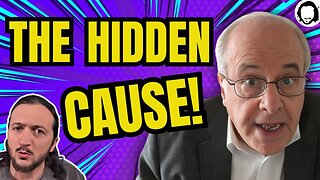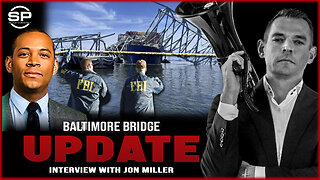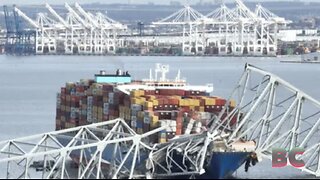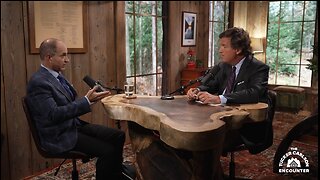Company Behind Baltimore Bridge Collapse Has Long History Of Safety Violations
New reports have revealed that the company that operated the vessel that struck the Francis Scott Key Bridge in Baltimore have a history of punishing whistleblowers who point out safety violations by the company. And as this investigation continues, we’ll probably be hearing more stories about the company’s gross conduct. Mike Papantonio & Farron Cousins discuss more.
Check out our merch by visiting our store: https://www.buyrof.com/
Subscribe to our podcast: http://www.ROFPodcast.com
Become a member today!: https://www.youtube.com/channel/UCYWIEbibRcZav6xMLo9qWWw/join
Support us by becoming a monthly patron on Patreon, and help keep progressive media alive!: https://www.patreon.com/TheRingofFire
Spread the word! LIKE and SHARE this video or leave a comment to help direct attention to the stories that matter. And SUBSCRIBE to stay connected with Ring of Fire's video content!
Support Ring of Fire by subscribing to our YouTube channel: https://www.youtube.com/theringoffire
Be sociable! Follow us on:
Facebook: http://www.facebook.com/RingofFireRadio
Twitter: https://twitter.com/RingofFireMedia
Instagram: https://www.instagram.com/ringoffirenetwork/
*This transcript was generated by a third-party transcription software company, so please excuse any typos.
New reports have revealed that the company that operated the vessel that struck the Francis Scott Key Bridge in Baltimore, well, they have a history of punishing whistleblowers who point out safety violations by the company. And this investigation continues. We're probably gonna hear more and more stories about the company's gross misconduct. I've got Ring of Fire's Farron Cousins with me to talk about this. So, Farron, what struck me about this story, okay, I get that there should be no, you know, we represent whistleblowers. I understand that very, very well. I don't understand what the problem is if an employee says, look, you got problems with the boat and he tells the employer that, and at the same time he tells the Coast Guard. What's, tell me about your take on this story. Maybe I'm missing something.
Well, we've got this law called the Siemens Protection Act. And what it says is that, hey, if you're working on the water, on a boat, whatever it is, you go to the Coast Guard when you have issues with the company rather than going to company management. So it is a bit weird. You have the federal government saying, hey, listen, if you see a problem, don't go to your boss. You come tell us. And it may have to, it's a confusing law. And again, like you said, I'm not sure it makes total sense.
It doesn't.
But if we're trying to rationalize it, it might be because of what's at stake. Obviously, when you're in a very large barge or vessel out there, a problem may immediately need a regulator to come in and fix it before the company could. Maybe.
Right. Think about what you just said. We're saying go to the bureaucracy first before you tell your employer. Yeah. The employer, I guess maybe this was done to protect the potential whistleblower, but the whistleblower has protection anyway, whether they go to the employer and say, look, you got something on barge that's gonna kill people. And that's what happened here. Six people were dead. And they had all kinds of problems on this barge. They got fire control problems. They had mechanical problems that were overwhelming. They had seaworthy problems that were overwhelming. So you go to the employer and say, you got these problems, at the same time you go to the Coast Guard. But I'm just not following this when they're saying, go to the bureaucrats first. Right? Go to the labor department first, especially if it's something as important and timely as this, it's kind of exigent kind of problem, isn't it?
Yeah. And when you are talking about problems like this, obviously the person or or group who's in an immediate position to be able to fix it would be the company itself. But with this particular whistleblower in question, it wasn't necessarily about that particular boat. But this whistleblower had told the company, he said, listen, you've got problems with the safety features. You've got problem with the boats themselves. You got people drinking on the job.
And they didn't do anything.
Right.
That's different.
Exactly.
So that's the distinction in this story.
Yeah. And so that's what is weird about it is you've got this law that almost conflicts with common sense.
It does. It totally conflicts because, I get in the end, the employee is paid $700,000 in damages and back wages, which should be. I mean, look, we have handled horrible whistleblower cases where the employer just victimizes whistleblower. But to say, wait, don't tell the employer, tell the bureaucracy first. That is just a non-starter to me. I just don't get that logic in this case.
Yeah. It is really weird.
-
 9:46
9:46
zalma
26 days agoBuilding That Could Collapse is Not a Covered Collapse
49 -
 9:25
9:25
ProgressiveTruthSeekers
1 month agoHow Capitalism Toppled The Baltimore Bridge - Richard Wolff
376 -
 17:07
17:07
Stew Peters Network
1 month agoFBI To Cover Up Bridge Collapse? FEDS Open Criminal Probe Surrounding Baltimore Bridge
26K17 -
 1:17
1:17
B.C. Begley
1 month agoFBI opens criminal investigation into Baltimore bridge collapse
46 -
 0:13
0:13
VeteransAgainstTreason
1 month agoNYC Construction Worker’s Political Analysis 2024
1.07K1 -
 12:18
12:18
Bannons War Room
1 month agoJack Posobiec On The FBI Opening Investigation Into Baltimore Bridge Collapse
29.9K47 -
 8:57
8:57
Lad From The Woods
1 month ago04-27-24 | Montréal Trip, A Disaster? Bus Break Down!!
32 -
 1:16:13
1:16:13
One Crown People Of Australia
6 months agoWhat is a corporation + Identity Trap
4641 -
 1:00
1:00
LJustice2021
1 month agoExposing FAKE MEDIA Mainstream Blackmail Bribery for the last 60years
914 -
 50:33
50:33
crashingthunder
1 month agoTucker Carlson Encounter: Pedro Israel OrtaA former agent says inside agency is falling apart
5191